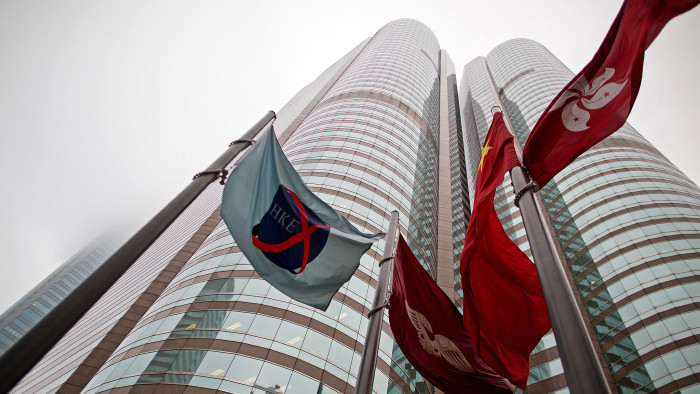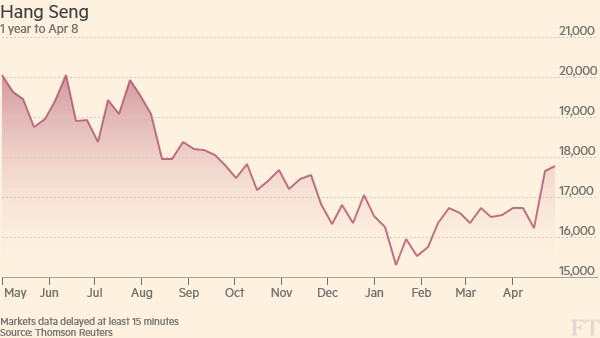HK-Shanghai stock trading link activity surges

Roula Khalaf, Editor of the FT, selects her favourite stories in this weekly newsletter.
A huge jump in equities purchases by Chinese investors has produced record trading volumes in Hong Kong, a signal that the prolonged stock rally on the mainland is finally spilling over into global markets.
Chinese use of the Stock Connect, which allows investors in Hong Kong and Shanghai to trade in each others’ markets, has risen sharply since mainland authorities late last month gave domestic mutual funds permission to use the scheme.
On Wednesday, southbound turnover — purchases and sales — through the Stock Connect leapt to HK$21bn ($2.7bn), more than three times the previous daily record set on April 2.
Southbound turnover has already surpassed HK$30bn in the first three trading days of April, up from HK$35bn last month, and just HK$10bn in February.
“The moves to lower the barriers for money managers to trade Hong Kong stocks have recently been a green light for traders,” said Chris Weston, chief strategist at IG, the spread betting group.
Just after 2.30pm local time on Wednesday, the Hong Kong bourse announced that the Rmb10.5bn ($1.7bn) daily southbound quota, which restricts mainland purchases of Hong Kong stocks, had been fully used up for the first time since the launch of the cross-border trading link in November.
Hong Kong stock exchange chairman C.K. Chow said he was “very encouraged” by the increase in trading volumes, but urged investors to tread carefully.
The surge in buy orders pushed the Hang Seng index up 3.8 per cent while the Hang Seng China Enterprises index — a list of Chinese companies trading in Hong Kong — gained 5.8 per cent.

Total turnover on the Hong Kong market hit HK$252bn, a record high. That compared with average daily turnover of HK$69bn in 2014. The previous record was set in October 2007, at the height of China’s last equity market bubble.
Those tipped to benefit from the increase in trading were among the biggest gainers. Shares in Hong Kong Exchanges & Clearing, the bourse operator, jumped 11.6 per cent while Haitong Securities, a Chinese broker, surged 18.5 per cent.
The move was partly catch-up as Hong Kong reopened following a three-day public holiday, while Shanghai was closed on Monday only. On Tuesday, the Shanghai Composite rallied 2.5 per cent and closed at its highest level since March 2008. Shanghai shares have doubled since the start of last year and the market’s gain of 23.5 per cent during 2015 has outpaced global rivals.
However, analysts said Chinese investors were increasingly looking to capitalise on the price gaps between onshore and offshore markets. Wednesday’s moves took the average premium of domestic listings, known as A shares, over Hong Kong-listed H shares down from 35 per cent to 28 per cent.
Steven Sun, HSBC’s China equity strategist, said in a report: “We think retail investors from across the border will soon be snapping up bargains on the Hong Kong stock market. With the A share market still rising in spite of weak economic data and poor corporate earnings in China, we believe Hong Kong H shares are becoming an increasingly attractive alternative.”
International investors also have been reallocating funds to the Hong Kong market, as shown by net selling of Shanghai equities through Stock Connect. On Wednesday, northbound sell trades outnumbered buys by almost two to one.
Mainland Chinese markets have outperformed all other global bourses this year, as a flood of retail investor money moves from deposits and property into shares. While the main Shanghai index has risen sharply since the start of the year the Shenzhen market is up by almost 50 per cent.
Comments